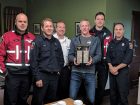
Features
Health and wellness
Hot topics
The firefighters’ perspective
Editor’s Note: This feature is the third installment in a five-part series exploring Oak Bay Fire Department’s holistic health and wellness program.
April 19, 2018
By Compiled by Sara Wegwit
 Meet D Shift The success of any health and wellness program is best demonstrated by the results achieved by the participants.
Meet D Shift The success of any health and wellness program is best demonstrated by the results achieved by the participants.The success of any health and wellness program is best demonstrated by the results achieved by the participants. In the case of the Oak Bay Fire Department in British Columbia, we thought it would be invaluable to share our members’ perspectives on how the health and wellness program has been impacting them directly. We recently invited crews to share their thoughts on the following questions.
■ What have been the program benefits?
(A Shift): “The program has provided a boost in comradery and has allowed team members to provide support and motivation to help fellow employees achieve their goals. There has been a noticeable shift in people’s physical and mental wellbeing.
(B Shift): “The health and wellness program has caused everyone to realize that their health is important and that they have the power to affect a change in their lifestyle. Members have changed the types of groceries they buy for the crew and the quantity they eat. One of the main successes has been the regular crew exercise periods and the crew bonding.”
(C Shift): “The biggest benefits that we have seen include improvements to eating and diet, crew cohesion, gaining mental health strategies, mental health being brought to the forefront, physical fitness time being scheduled and weight loss. Some of our successes and wins include more openness and mental and physical benefits for members. Additionally, members that were not physically and or mentally taking care of themselves have benefitted from the department wide approach as they are encouraged by others to improve.”
(D Shift): “The benefits that we have observed include increased team morale, mental health awareness as well as dietary knowledge. Our meals are smaller in size, contain more vegetables and less sugar and carbohydrates. The wins include a willingness to share more of our mental state with each other on a day to day basis which benefits us greatly when we are faced with a call that might result in a CISM debriefing. During these difficult times our crew is already comfortable sharing our thoughts and feelings which hopefully helps us ward off further mental health challenges.”
■ What are some of the challenges?
(A Shift): “Time management has been a major setback within our program. On an individual basis, a lack of commitment or physical limitations has withdrawn some from making it a daily routine and with the addition of trying to balance the program in between calls, training and other daily routines, it can become less of a priority then it ought to be.”
(B Shift): “It has been a challenge to get the entire crew together to perform health and wellness activities together. The crew has worked hard to ensure the exercise periods have occurred regularly even if the one member is too busy to participate.”
(C Shift): “Some the challenges that we have encountered relate to scheduling, full buy in, and competing priorities at times. Some of the action steps that we have taken to address these challenges have included reminders, encouragement, and flexible scheduling.”
(D Shift): “A few of the challenges we have faced are ensuring the participation of everyone, allotting the time and making the program a priority.”
■ How has your crew/department/families been impacted by the program?
(B Shift): “Members of the crew have changed the way they think about food and the types of exercises that are best for them. Some of our family members attended a department wide educational session on mental health with a registered psychologist.”
(C Shift): “We have noticed weight loss. As a department, we are more cohesive, have dramatically better eating habits, and there is a healthy level of competition between crews. Our families have been included in education on the mental and physical challenges that firefighters experience. They have benefitted by having a healthier and happier spouse/partner. We have helped to bring a healthier lifestyle home by modelling this behaviour for our families.”
(D Shift): “Our crew has found that the skills and knowledge we have learned here at the fire hall has impacted our personal lives in a positive way. Our families are eating healthier, we are more mindful of other people, and have gained skills to deal with daily stressors. The crew has found the chaplaincy a tremendous resource. Chaplain Gill is a trusted friend and is another avenue for all of us to utilize.”
■ What have been your highlights?
(A Shift): “Highlights have included the variety of seminars such as personal trainers, nutritionists, and various medical professionals that have provided insight on topics from stress reduction to firefighter specific functional fitness. The continuing fitness testing and annual health risk assessment has provided us with a progress report to how we are developing and has given us a foundation to work from.”
(C Shift): “Winning crew challenges and participating in the cross-platoon challenges.”
(D Shift): “We have appreciated the mental health information sessions hosted by our registered nurse Sara or her guests. The nutritional information delivered by experts has been invaluable. All these educational sessions are an opportunity for each member to have a personal or one on one trainer with a professional in the health industry. Our crew takes pride in being the “Healthiest Platoon of the Year” champions in two of the last four years. We enjoy the social aspect of the cross-platoon challenges that get us outside on our days off and very much enjoy going for a beer afterwards. We feel this social bonding is an important part of why we are such a tight group and has created a very trusting environment.”
■ What advice would you give another department considering a Health and Wellness WFI program?
(A Shift): “Have an outside consultant develop the program from models that currently exist to ensure that there is focus and direction from the initial conception. It should be accommodating to all members of the department and their abilities so that it can be easily followed and will continue to apply the program to the point where it becomes a daily routine.”
(B Shift): “Make sure that you have complete participation from all the crews and assistant chiefs. Ensure that the daily schedule will be able to permit for health and wellness training periods.”
(C Shift): “You definitely need an outside consultant to get the program going and to keep it on track. It is also important to develop buy-in through a collaborative process from all levels of the department.”
(D Shift): “The only way this program works is to have buy in from all involved, including management. Another department will have to realize that any WFI program requires a budget, and everyone must be flexible and adaptable with the daily routine and schedule. Once the managers make this program a set part of each shift, the firefighters will all see the benefits of participating.”
■ What makes investing in a Health and Wellness program worth it?
(B Shift): “The investments being made in long term health and reducing health problems of members will benefit a fire department in the long run.”
(C Shift): “Investing in a health and wellness program will help team members to gain self-awareness which allows for setting goals and aspirations, enables the group to assist members who require assistance, and will help to establish an openness and willingness to request or accept this assistance.”
(D Shift): “If done consistently all will see strength and endurance gains, an increase in mental health awareness, and will gain valuable knowledge pertaining to what foods we should be putting in our bodies. All of these aspects theoretically should keep us healthier, not only reducing sick plan usage but enabling all members to have the ability to live a longer more active life.”
Sara Wegwitz is a registered nurse who specializes in mental fitness and resilience training. She is the primary facilitator of the Oak Bay Fire Department’s wellness program. Contact her at sara@tailormakinghealth.ca.
Print this page

